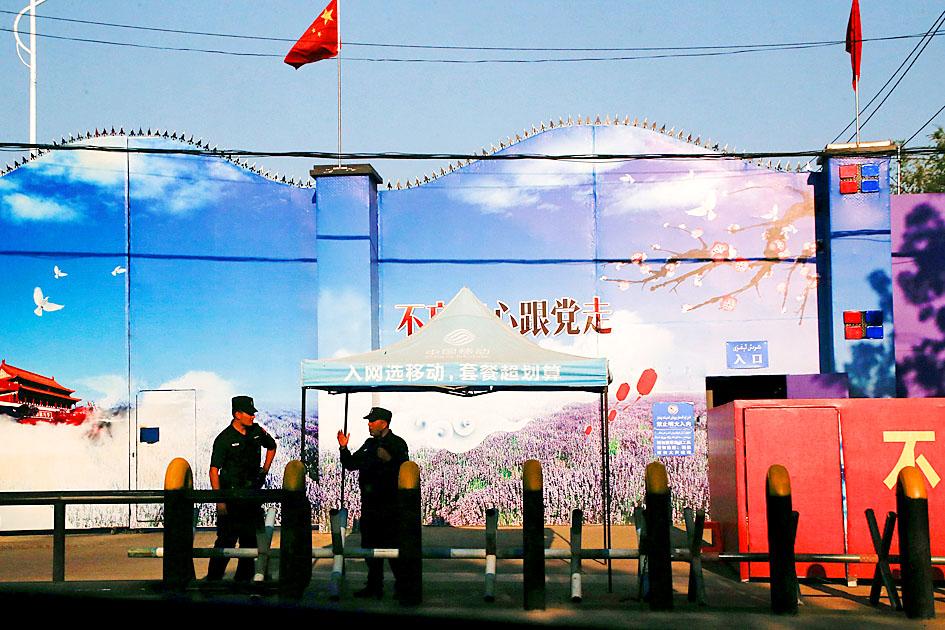The Canadian parliament on Monday passed a non-binding motion saying China’s treatment of the Uighur Muslim minority in the Xinjiang region constitutes genocide, putting pressure on Canadian Prime Minister Justin Trudeau’s government to follow suit.
The Canadian House of Commons voted 266-0 for the motion brought by the opposition Conservative Party.
Trudeau and his Cabinet abstained from the vote, although Liberal backbenchers widely backed it.

Photo: Reuters
The motion was also amended just before the vote to call on the International Olympic Committee to move next year’s Winter Olympics from Beijing if the treatment continues.
Trudeau’s Conservative rivals have been pressuring him to get tougher on China. After Canada arrested Huawei Technologies Co (華為) chief financial officer Meng Wanzhou (孟晚舟) in 2018 on a US warrant, China detained two Canadians on spying charges, igniting bilateral tensions that still linger.
China has been widely condemned for setting up complexes in Xinjiang that it describes as “vocational training centers” to stamp out extremism and give people new skills, and which others have called concentration camps.
Beijing denies accusations of rights abuses in Xinjiang.
Citing testimony, documents and media reports of human rights abuses against Uighurs, Conservative MP Michael Chong said: “We can no longer ignore this. We must call it for what it is — a genocide.”
Chinese Ministry of Foreign Affairs spokesman Wang Wenbin (汪文斌) yesterday said that the motion “disregards facts and common sense,” adding that Beijing had “lodged stern representations” with Canada.
Chinese Ambassador to Ottawa Cong Peiwu (叢培武) denied accusations of genocide.
“Western countries are in no position to say what the human rights situation in China looks like,” Cong said in an interview before the vote.
“There is no so-called genocide in Xinjiang at all,” he said.
Trudeau has been reluctant to use the word genocide, suggesting that seeking broad consensus among Western allies on Chinese human rights issues would be the best approach.
“Moving forward multilaterally will be the best way to demonstrate the solidarity of Western democracies ... that are extremely concerned and dismayed by reports of what’s going on in Xinjiang,” Trudeau said on Friday after speaking to fellow G7 leaders.
Trudeau and US President Joe Biden were to hold a virtual bilateral meeting yesterday afternoon, and relations with China were likely to be discussed, a government source said.
Former US president Donald Trump — on his last full day in office last month — said China had committed “genocide and crimes against humanity” by repressing Uighur Muslims.
The Biden administration is trying to ensure that the genocide declaration is upheld, said Linda Thomas-Greenfield, his nominee to be ambassador to the UN.

TRAGEDY STRIKES TAIPEI: The suspect died after falling off a building after he threw smoke grenades into Taipei Main Station and went on a killing spree in Zhongshan A 27-year-old suspect allegedly threw smoke grenades in Taipei Main Station and then proceeded to Zhongshan MRT Station in a random killing spree that resulted in the death of the suspect and two other civilians, and seven injured, including one in critical condition, as of press time last night. The suspect, identified as a man surnamed Chang Wen (張文), allegedly began the attack at Taipei Main Station, the Taipei Fire Department said, adding that it received a report at 5:24pm that smoke grenades had been thrown in the station. One man in his 50s was rushed to hospital after a cardiac arrest

A car bomb killed a senior Russian general in southern Moscow yesterday morning, the latest high-profile army figure to be blown up in a blast that came just hours after Russian and Ukrainian delegates held separate talks in Miami on a plan to end the war. Kyiv has not commented on the incident, but Russian investigators said they were probing whether the blast was “linked” to “Ukrainian special forces.” The attack was similar to other assassinations of generals and pro-war figures that have either been claimed, or are widely believed to have been orchestrated, by Ukraine. Russian Lieutenant General Fanil Sarvarov, 56, head

SAFETY FIRST: Double the number of police were deployed at the Taipei Marathon, while other cities released plans to bolster public event safety Authorities across Taiwan have stepped up security measures ahead of Christmas and New Year events, following a knife and smoke bomb attack in Taipei on Friday that left four people dead and 11 injured. In a bid to prevent potential copycat incidents, police deployments have been expanded for large gatherings, transport hubs, and other crowded public spaces, according to official statements from police and city authorities. Taipei Mayor Chiang Wan-an (蔣萬安) said the city has “comprehensively raised security readiness” in crowded areas, increased police deployments with armed officers, and intensified patrols during weekends and nighttime hours. For large-scale events, security checkpoints and explosives

PUBLIC SAFETY: The premier said that security would be tightened in transport hubs, while President Lai commended the public for their bravery The government is to deploy more police, including rapid response units, in crowded public areas to ensure a swift response to any threats, President William Lai (賴清德) said yesterday after a knife attack killed three people and injured 11 in Taipei the previous day. Lai made the remarks following a briefing by the National Police Agency on the progress of the investigation, saying that the attack underscored the importance of cooperation in public security between the central and local governments. The attack unfolded in the early evening on Friday around Taipei Main Station’s M7 exit and later near the Taipei MRT’s Zhongshan